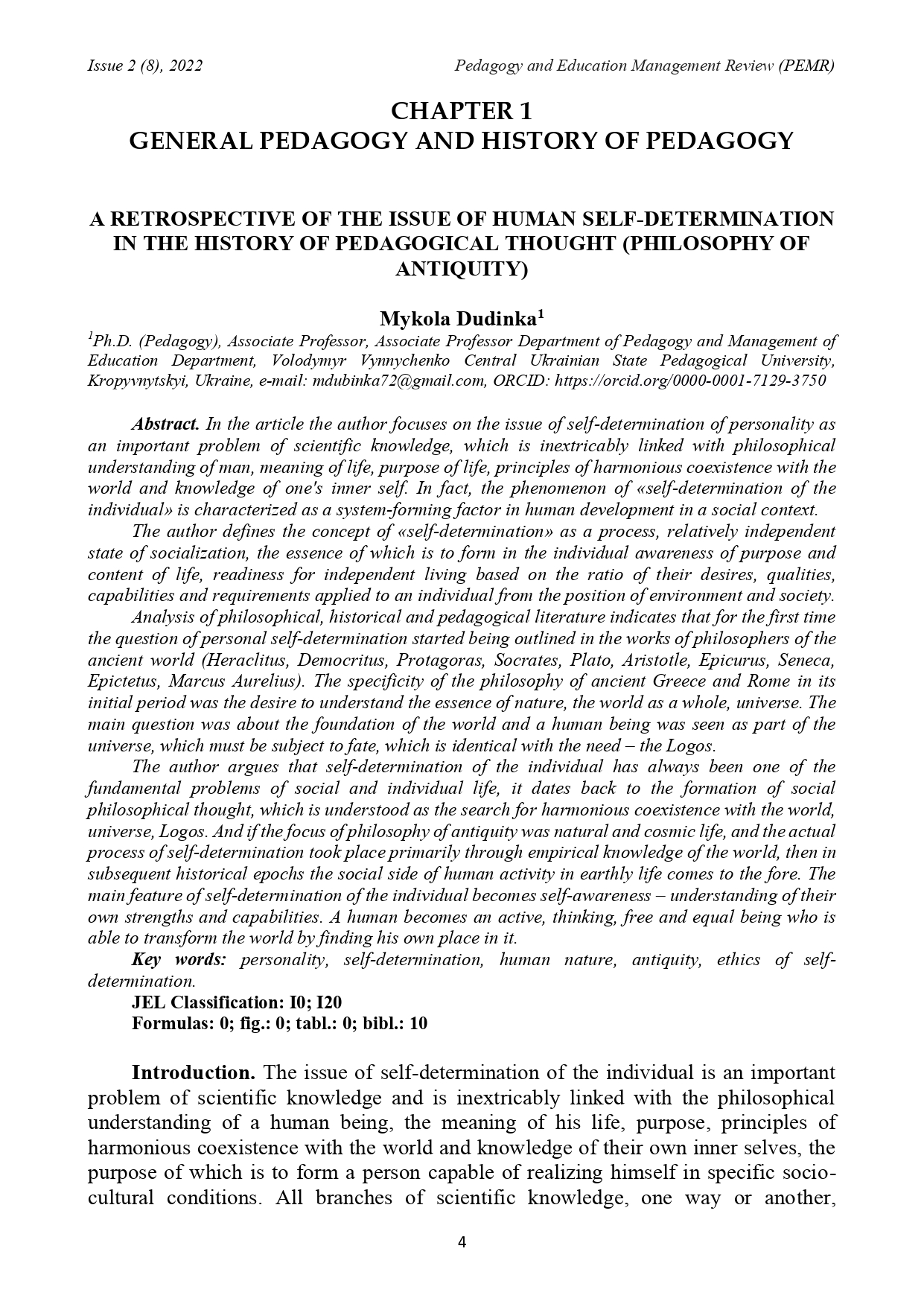A RETROSPECTIVE OF THE ISSUE OF HUMAN SELF-DETERMINATION IN THE HISTORY OF PEDAGOGICAL THOUGHT (PHILOSOPHY OF ANTIQUITY)
DOI:
https://doi.org/10.36690/2733-2039-2022-2-4Keywords:
personality, self-determination, human nature, antiquity, ethics of self-determinationAbstract
In the article the author focuses on the issue of self-determination of personality as an important problem of scientific knowledge, which is inextricably linked with philosophical understanding of man, meaning of life, purpose of life, principles of harmonious coexistence with the world and knowledge of one's inner self. In fact, the phenomenon of «self-determination of the individual» is characterized as a system-forming factor in human development in a social context.
The author defines the concept of «self-determination» as a process, relatively independent state of socialization, the essence of which is to form in the individual awareness of purpose and content of life, readiness for independent living based on the ratio of their desires, qualities, capabilities and requirements applied to an individual from the position of environment and society.
Analysis of philosophical, historical and pedagogical literature indicates that for the first time the question of personal self-determination started being outlined in the works of philosophers of the ancient world (Heraclitus, Democritus, Protagoras, Socrates, Plato, Aristotle, Epicurus, Seneca, Epictetus, Marcus Aurelius). The specificity of the philosophy of ancient Greece and Rome in its initial period was the desire to understand the essence of nature, the world as a whole, universe. The main question was about the foundation of the world and a human being was seen as part of the universe, which must be subject to fate, which is identical with the need – the Logos.
The author argues that self-determination of the individual has always been one of the fundamental problems of social and individual life, it dates back to the formation of social philosophical thought, which is understood as the search for harmonious coexistence with the world, universe, Logos. And if the focus of philosophy of antiquity was natural and cosmic life, and the actual process of self-determination took place primarily through empirical knowledge of the world, then in subsequent historical epochs the social side of human activity in earthly life comes to the fore. The main feature of self-determination of the individual becomes self-awareness – understanding of their own strengths and capabilities. A human becomes an active, thinking, free and equal being who is able to transform the world by finding his own place in it.
Downloads
References
Aristotel'. (1983). Politika. [Politics]. Sochineniya : V 4-kh t. / Per. s drevnegrech. obshch. red. A. I. Dovatura. M. : Mysl', 1983. T.4. 629 s. Moscow, [in Russian].
Asmus, V. F. (1976). Antichnaya filosofiya. [Аncient philosophy]. M. : Vysshaya shkola, 1976. 543 s. Moscow, [in Russian].
Hamina, T. S., Ratsul, A. B., Turchak, A. L. (2003). Istoriya pedahohiky. [History of pedagogy]. Chastyna I. Istoriya zarubizhnoyi pedahohiky (navch.-metod. posibnyk / Za red. A. B. Ratsula. Kirovohrad : TOV «Imeks LTD», 2003. 132 s. Kirovohrad, [in Ukrainian].
Istoriya pedahohiky. (1973). [History of pedagog]. / Za red. M. S. Hrytsenka. K. : Vyshcha shkola, 1973. 447 s. Kyiv, [in Ukrainian].
Platon. (1971). Gosudarstvo [State]. Sochineniya. V 3-kh t. Per. s drevnegrech pod obshch. red. A. F. Loseva i V. F. Asmusa. M. : Mysl', 1971. T. 3, CH. 1. S. 89–454. Moscow, [in Russian].
Ratsul, A. B., Radul, O. S., Ratsul, O. A. (2008). Istoriya zarubizhnoyi pedahohiky. [History of foreign pedagogy]. Navchalʹnyy posibnyk. Kirovohrad : KDPU im. V. Vynnychenka, 2008. 352 s. Kirovohrad, [in Ukrainian].
Safin, V. F., Nikov, G. P. (1984). Psikhologicheskiy aspekt samoopredeleniya. [The psychological aspect of self-determination]. Psikhologicheskiy zhurnal. 1984. № 4. S. 65–74.
Sysoyeva, C. O., Sokolova, I. V. (2003). Narysy z istoriyi rozvytku pedahohichnoyi dumky [Essays on the history of pedagogical thought]: Navchalʹnyy posibnyk. K. : Tsentr navch. literatury, 2003. 308 s. Kyiv, [in Ukrainian].
Sotsioloho-pedahohichnyy slovnyk (2015). [Sociological and pedagogical dictionary]. / Za red. V. V. Radula, vyd. 2-e. Kharkiv : Machulin, 2015. 444 s. S. 222–223. Kharkiv, [in Ukrainian].
Shcherbatyuk, B. A. (2002). Strukturni elementy samovyznachennya osobystosti.[Structural elements of self-determination]. Visnyk Kharkivsʹkoho yniversytetu, 2002. № 539. S. 158–160. Kharkiv, [in Ukrainian].

Downloads
Published
How to Cite
Issue
Section
License
Copyright (c) 2022 Mykola Dudinka

This work is licensed under a Creative Commons Attribution-NonCommercial-NoDerivatives 4.0 International License.





